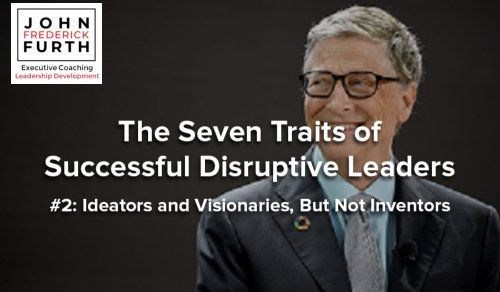The Seven Traits of Successful Disruptive Leaders #2: Ideators and Visionaries, But Not Inventors
In the wake of the most disruptive invention in over 500 years – the internet – the kind of big, one-off inventions that we’ve seen in the past like airplanes, light bulbs, recording devices, etc. are no longer rocking the world the way highly disruptive ideas and applications are. Even inventions now considered highly disruptive such as electric vehicles were often created generations ago.
Electric vehicles were in fact disrupted and temporarily rendered obsolete a little over 100 years ago when internal combustion engines and the electric starter motor made cars using fossil-based fuels cheaper and easier to operate. That all started to change at the beginning of the 21st century when the urgency to lesson our dependency on dirty, politically charged and fast-depleting fossil fuels reached a fevered pitch. An old invention re-emerged as a new and disruptive idea whose time had finally come.
Likewise, today’s disruptive business people are decidedly not inventors. They are experts at combining existing technologies, business models and processes in new and unique ways.
Michael Dell, for example, did not invent the computer – he didn’t even make any major changes to the hardware or software of computers. Dell did something far more important. He developed a better manufacturing and distribution system that made computers cheaper, easier and faster to order and have delivered. In the process he turned many traditional slow, mistake-ridden and expensive distributors into dinosaurs.
Bill Gates is another brilliant ideator who personally never really invented anything. Instead he used his deep knowledge of technology and ability to not only spot but also create trends to change the face of the computing industry forever. He also used very aggressive business tactics to shut out or eliminate competitors.
Gates and his team didn’t invent, build or design the operating system (OS) that turned Microsoft into a highly profitable monopoly, they bought it from Seattle Computer Products (SCP), and then licensed it to IBM. It very quickly made every other OS for the PC – with maybe the exception of Linus – obsolete while generating immense wealth for Gates, his employees and investors.
Xbox, another pillar of Microsoft’s success, was a late comer to a category already saturated with play stations and video consoles. In many ways Xbox was just a more developed version of Sony’s PlayStation. It was only after funneling billions of dollars into developing and aggressively marketing Xbox that Microsoft was able to overtake Sony and other major players to dominate the category.
Even the legend of Edison as one of the greatest inventors has recently proven to be more of a myth than reality. While Edison may have invented a few things, he spent more time collecting patents, heading a team of developers, and creating companies. In this way Thomas Edison was more like our current successful disruptors such as Steve Jobs, Bill Gates and Michael Dell.
Related reading:
The Seven Traits of Successful Disruptive Leaders #1: Brainiacs
Strategy and The Effective Leader
Egos and Ethics
We will get back to you as soon as possible.
Please try again later.
Recent Posts




